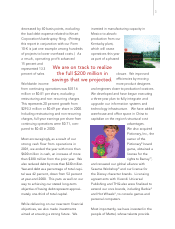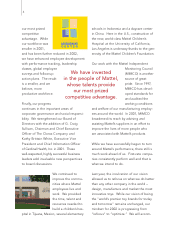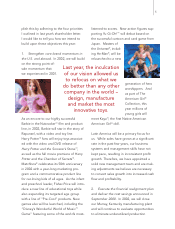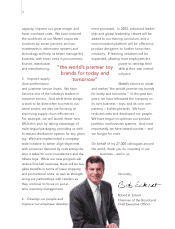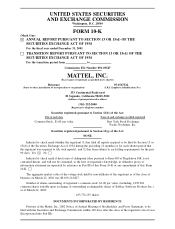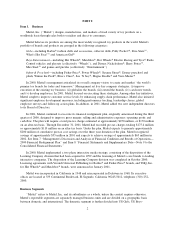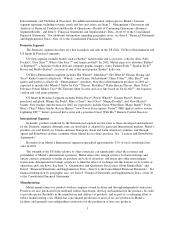Mattel 2001 Annual Report Download - page 15
Download and view the complete annual report
Please find page 15 of the 2001 Mattel annual report below. You can navigate through the pages in the report by either clicking on the pages listed below, or by using the keyword search tool below to find specific information within the annual report.Commitments
In the normal course of business, Mattel enters into contractual arrangements for future purchases of goods
and services to ensure availability and timely delivery, and to obtain and protect Mattel’s right to create and
market certain products. Certain of these commitments routinely contain provisions for guaranteed or minimum
expenditures during the term of the contracts. Current and future commitments for guaranteed payments reflect
Mattel’s focus on expanding its product lines through alliances with businesses in other industries.
As of December 31, 2001, Mattel had outstanding commitments for 2002 purchases of inventory of
approximately $121 million. Licensing and similar agreements with terms extending through the year 2010
contain provisions for future guaranteed minimum payments aggregating approximately $379 million. See
Item 8 ‘‘Financial Statements and Supplementary Data—Note 7 to the Consolidated Financial Statements.’’
Mattel ships products in accordance with delivery schedules specified by its customers, which usually
request delivery within three to six months. In the toy industry, orders are subject to cancellation or change at
any time prior to shipment. In recent years, a trend toward just-in-time inventory practices in the toy industry
has resulted in fewer advance orders and therefore less backlog of orders. Mattel believes backlog orders at any
given time may not accurately indicate future sales.
Financial Instruments
Mattel’s results of operations and cash flow may be impacted by exchange rate fluctuations. Mattel seeks
to mitigate its exposure to market risk by monitoring its currency exchange exposure for the year and partially
or fully hedging such exposure using foreign currency forward exchange and option contracts primarily to
hedge its purchase and sale of inventory, and other intercompany transactions denominated in foreign
currencies. These contracts generally have maturity dates of up to 18 months. In addition, Mattel manages its
exposure through the selection of currencies used for international borrowings and intercompany invoicing.
Mattel’s results of operations can also be affected by the translation of foreign revenues and earnings into US
dollars. Mattel does not trade in financial instruments for speculative purposes.
For additional information regarding foreign currency contracts, see ‘‘International Segment’’ above, Item
7a ‘‘Quantitative and Qualitative Disclosures About Market Risk’’ and Item 8 ‘‘Financial Statements and
Supplementary Data—Note 8 to the Consolidated Financial Statements.’’
Seasonal Financing
Mattel’s financing of seasonal working capital, as well as that of the industry taken as a whole, typically
grows throughout the first half of the year and peaks in the third or fourth quarter, when accounts receivable are
at their highest due to increased sales volume, and when inventories are at their highest in anticipation of
expected second half sales volume. See ‘‘Seasonality.’’ Mattel expects to finance its seasonal working capital
requirements for the coming year by using existing and internally generated cash, issuing commercial paper,
selling certain trade receivables under one of its committed domestic revolving credit facilities, and using
various short-term bank lines of credit. In addition, Mattel avails itself of individual short-term foreign credit
lines with a number of banks and enters into agreements with banks of its foreign subsidiaries for non-recourse
sales of certain of its foreign subsidiary receivables, which arrangements will be used as needed to finance
seasonal working capital requirements of certain foreign subsidiaries.
Mattel’s domestic unsecured committed revolving credit facility provides $1.0 billion in short-term
borrowings from a commercial bank group. This facility was originally executed in 1998 for a term of five
years, expiring in 2003. In March 2002, Mattel amended and restated this facility into a $1.060 billion, 3-year
facility that expires in 2005 with substantially similar terms and conditions. In first quarter 2001, Mattel
renewed its 364-day, $400.0 million unsecured committed credit facility, with essentially the same terms and
7


